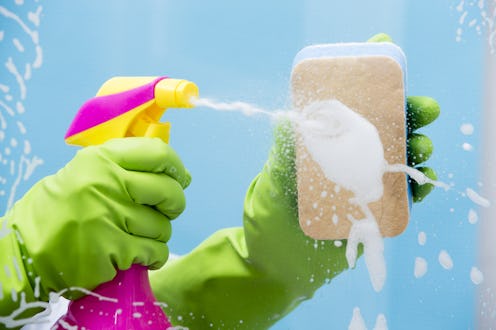Life
Don't Use These Household Items If They've Expired

You have enough important dates to keep track of in your everyday life, so it hardly seems fair that even your food and home products shove deadlines down your throat. But, paying attention to the expiration dates is important. There are some household items you should never use past the expiration date — period.
If you're anything like the rest of America, you tend to look at the expiration date as more of a "suggestion." I've been known to eat cereal or a handful of chips while proclaiming, "What, they only expired two days ago!" And, in most cases, that's totally fine. However, there are a few things you simply shouldn't use after that magic date has passed.
Also, it's important to know the difference between a firm expiration date, and a "sell by" date. If I had my way, brands would eliminate those pesky "sell by" dates all together. Sure, perhaps they're helpful with managing grocery store inventory. But, I don't like standing in front of my fridge wondering if I'm going to die if I eat that turkey with a "sell by" date of two weeks ago. Like, can't you just tell me when it's simply not safe anymore?
To answer that great mystery of life, how far past the "sell by" date you can go depends on the food. This is usually printed on dairy and meat items, and you typically are safe going anywhere from one to three days past the date with meats, five days to a week with milk, and three to five weeks with eggs.
But let's get back to the issue at hand. Here are seven things you simply shouldn't use after they have expired.
1. Bleach
You wouldn't think that bleach ever expires — but it does. In fact, it will keep for only about six months when stored in temperatures between 50 and 70 degrees. Because you use bleach to disinfect surfaces in your home, you obviously want it to be effective. So, don't plan on using bleach after that time — unless you want a germ-filled house.
2. Shampoo and Conditioner
The Food and Drug Administration likes to make things complicated, so they don't require that manufacturers label their products with expiration dates. Obviously, you don't want to use shampoo or conditioner that stinks, or has a strange consistency. But, most can actually be considered "bad" before they present any of these signs. A good rule of thumb is to keep an opened bottle for no more than 18 months, and an unopened bottle for no more than three years. At the very least, expired shampoos and conditioners won't work the way they're supposed to. But, you can also run the risk of spreading bacteria onto your scalp, and opening the door for an infection. Yuck.
3. Nail Polish
I'm fairly certain that I still have some bottles of nail polish from middle school. Using nail polish after it expires definitely isn't dangerous to your health. But, you shouldn't expect the perfect color, consistency, or overall look after approximately two years. We've all reached for those bottles of polish that are completely dried up or strangely colored. Sort through your polishes frequently so you're sure that you're hanging onto only the ones you can actually still use.
4. Laundry Detergent
Similar to bleach, laundry detergent doesn't really "go bad" to a point where it's harmful to your health or safety. However, it's definitely less effective after a certain date. And, I'd like to think that you actually want your clothes to get clean when you wash them. Whether you use liquid or powdered detergent, you shouldn't plan to keep it for years on end. Opened detergent is good for about six months from opening, while the unopened bottles will last for about nine months to one year.
5. Medications
Everything you pick up at the pharmacy definitely has an expiration date. And, like most of the items on this list, you want to stick to that date if it's important that your product is 100 percent effective. Of course, if you have any questions about an expired medication's safety or effectiveness, go ahead and ask your pharmacist for their advice!
6. Dish Detergent
You shouldn't keep your dish detergent for longer than one year if you want it to be effective. And, since you use the liquid to disinfect dishes that multiple people share, effectiveness of your dish detergent is important for stopping the spread of germs and bacteria.
7. Batteries
Batteries typically have a long shelf life of around 10 years. But, you don't need to worry about using them past their expiration date, as they just simply won't work.
Images: Fotolia; Keoni Cabral, Brittney Bush Bollay, sara, H.A.M. phtgrphy, Sally, Mike Mozart (2), elycefeliz, macwagen, Rob Nunn/Flickr; Giphy (3)